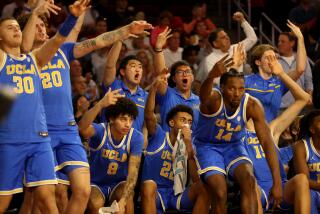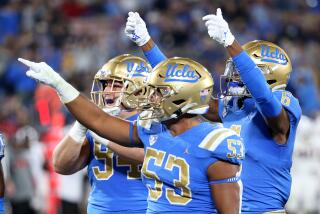BATTLE FOR THE ROSES: USC vs. UCLA : Peete Goes From Hospital to Practice : Status Still Uncertain for USC Quarterback Getting Over Measles
The first step to playing football is getting out of the hospital. USC quarterback Rodney Peete, who has been ill with the measles, did that Thursday, leaving St. Mary’s in Long Beach.
Then Peete watched some film and was an observer at practice, where he also threw a football around, for 25 minutes.
But will he play against UCLA Saturday in the Rose Bowl showdown game?
“His status is still uncertain,” Coach Larry Smith said. “Doctors will re-check him again tomorrow.”
Smith wouldn’t even hazard a guess as to whether Peete, a strong candidate for the Heisman Trophy, will: (1) start, (2) play a little or (3) cheer on his teammates from the sidelines as Pat O’Hara, an inexperienced sophomore quarterback, goes against the Bruins.
Measles is a contagious disease, but Athletic Director Mike McGee said: “Doctors tell us as of last night, (Peete) has ended his infectious period.”
There are also possible complications from measles such as encephalitis--inflammation of the brain--pneumonia or bronchitis.
An internist, who has been treating Peete and did not want to be identified, addressed that possibility, saying:
“We’re very aware of any complications with measles. There is no pneumonia, his fever is down and there is a very low risk of encephalitis, 1 in 3,000. We’ll continue to follow him closely.
“If he feels up to (playing), we feel there is no risk, but we’ll continue to evaluate him. Those symptoms are in acute cases of measles, and Rodney didn’t have them.”
Some other area medical authorities said, however, that it would not be wise for Peete to play Saturday.
Said Dr. Loraine Stern, a Newhall pediatrician who is a past president of the American Academy of Pediatrics:
“Measles is a more devastating disease than most people realize. Measles can make you terribly, terribly sick. . . . (Peete) is a young man in the peak of physical shape, so he’s certainly better able to recover than (the average person) would be. But if he’s had 5 to 7 days of fever, it’s hard to believe he could be able to recover adequately (to play Saturday).
“If he were my son, I’d say no. I think he’d get creamed.”
Dr. Stern also had a word of warning for UCLA.
“(Peete’s) teammates have already been exposed to him. The opposing team is at the increased risk of exposure.”
Dr. Stephen Waterman, chief of acute communicable disease control, Los Angeles County Department of Health Services, said: “From a personal health standpoint, I don’t think too many people (with measles) would be able to play football.
“In fact, I would be concerned a week after onset (of symptoms) about relapse and complications.”
Dr. Lawrence Ross, infection control specialist at Children’s Hospital in Los Angeles, said:
“Theoretically, I think (Peete) might be at some risk. I would personally feel he would not be up to snuff to play and I’m not sure it would be in his best interests (to do so). He could be dehydrated from fever. I don’t think he would be at his best, and theoretically, there might be some risk.”
Smith, however, suggested that Peete had not been laid low by the disease.
Facing a battery of television cameras, he said: “Rodney is eating solids now, and it was believed he’d get better rest out of the hospital. He said he feels stronger and he looked normal.”
He emphasized, though, that Peete will not play against UCLA unless he has medical clearance.
Smith said that he would have no more press conferences until after the game and that Peete and O’Hara are off-limits to reporters.
“On Friday, the kids have to get ready for the game and I have to coach,” Smith said. “After tonight, you can kiss me goodby.”
Asked how his team is responding to the possible loss of their star quarterback in the most important game of the season to date, Smith said: “Young people are resilient . . . they haven’t been affected a whole lot. We’ve had good practices, and their mind is on what we’re doing.”
Asked to estimate the percentage involved in Peete’s playing, or not, Smith said, “I can’t do that now.”
He added that Peete’s recovery period is being watched closely and everyone is making sure that he gets plenty of rest.
When someone suggested that the Trojans would be an underdog team against the Bruins without Peete, Smith replied: “Look what the Dodgers did.”
At UCLA, players will be immunized Saturday, a spokesman said.
“We’re trying to find out which of our players have had the measles (and) which have been immunized since 1970,” said the Bruins’ physician, Dr. Gerald Finerman. “In essence, we are recommending immunization to all who do not have good evidence that they have not.”
Finerman said he had some misgivings about exposing the team to USC players who might be infected.
“If you knew you were at risk, you wouldn’t normally expose yourself,” he said.
Under the circumstances, the Bruins have no choice, he said.
“Obviously, we could say the risk is too great and we’re not going to play,” Finerman said. “But we’re not going to do that.”
Coach Terry Donahue would not discuss the situation, walking briskly off the practice field and into a meeting.
Finerman said his staff recommended to all athletes that they be immunized.
“Measles outbreaks, unfortunately, are almost a yearly occurrence on college campuses,” he said. “I wouldn’t be surprised if in 2 or 3 weeks we have an outbreak at UCLA because the virus goes through the community.”
Times staff writers Jerry Crowe and Allan Parachini contributed to this story.
More to Read
Go beyond the scoreboard
Get the latest on L.A.'s teams in the daily Sports Report newsletter.
You may occasionally receive promotional content from the Los Angeles Times.






